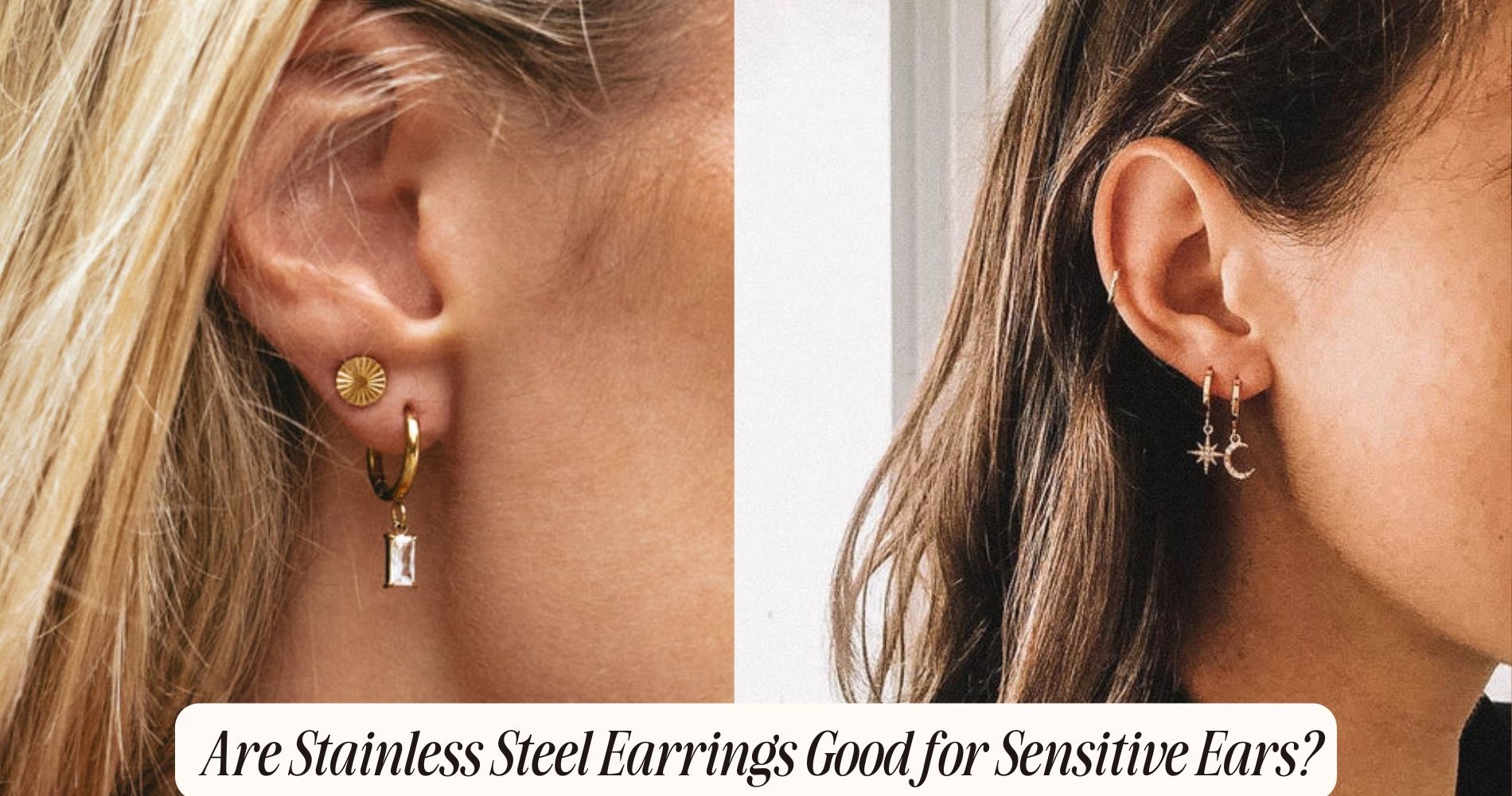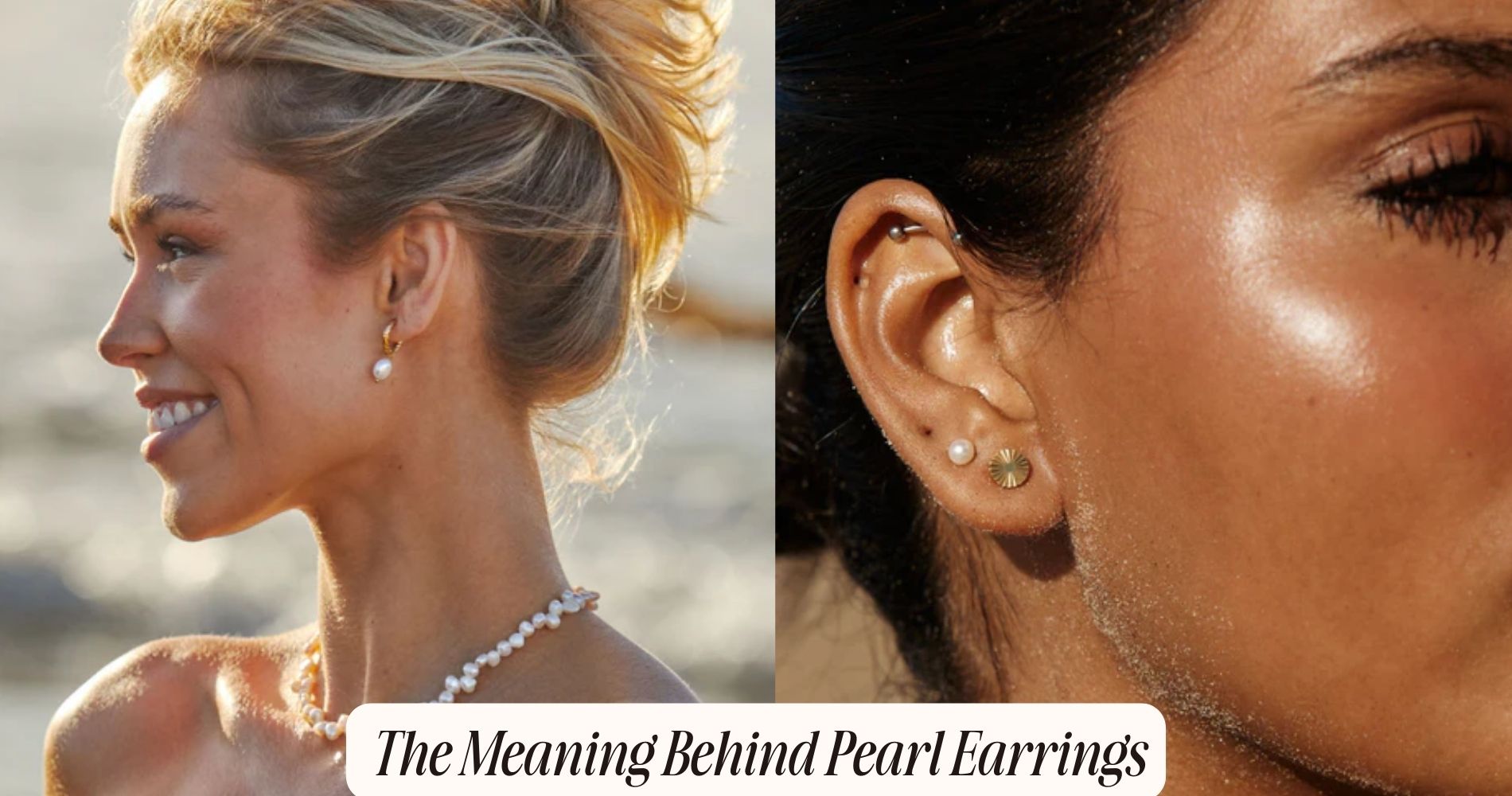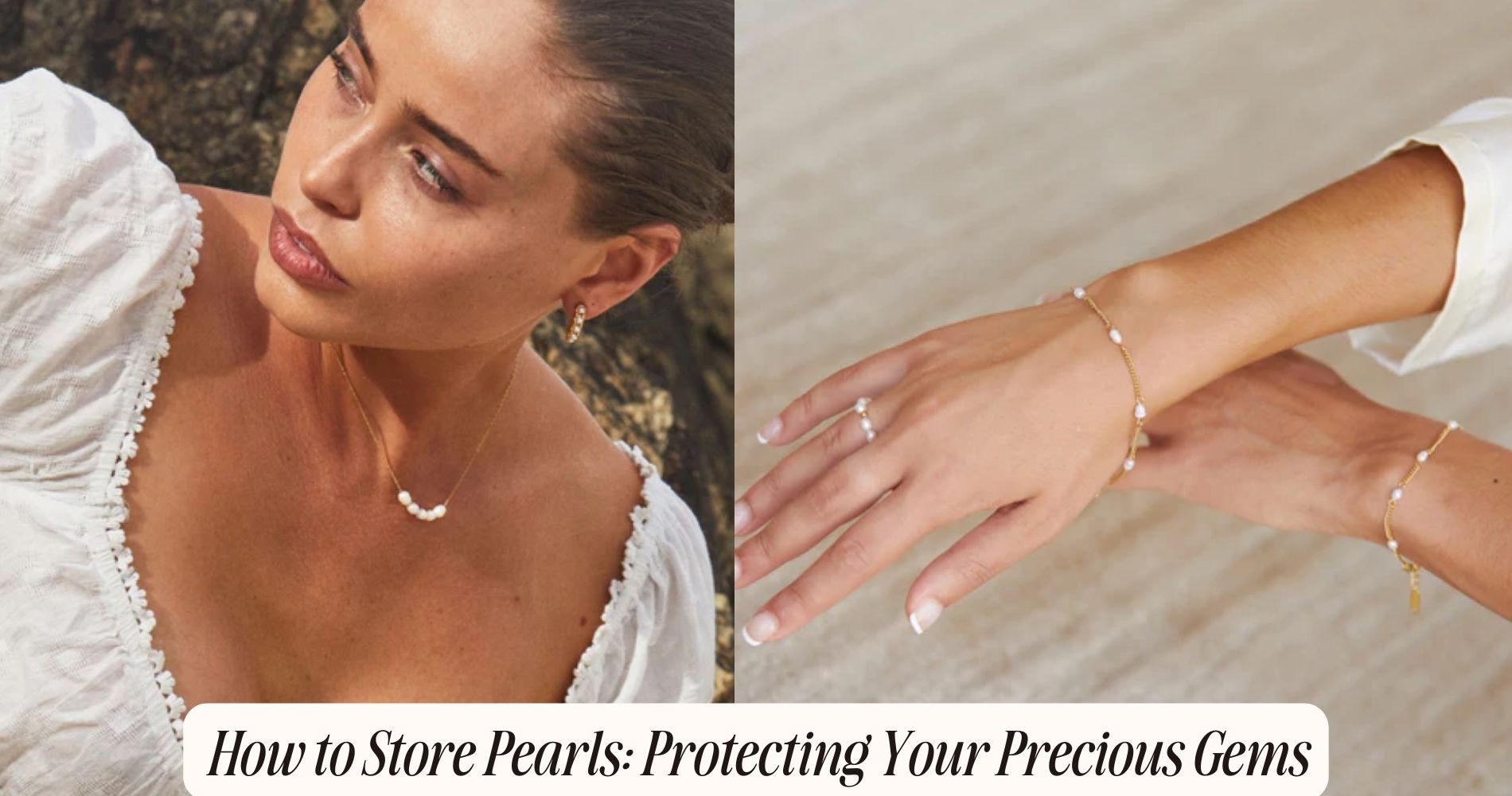
Are Stainless Steel Earrings Good for Sensitive Ears?
Are stainless steel earrings good for sensitive ears? Yes, stainless steel earrings are a great option for sensitive ears. They're made from a hypoallergenic alloy that resists corrosion and tarnishing, ensuring both style and durability. Higher-grade stainless steel, like 316L, contains minimal nickel, reducing the risk of allergic reactions. Many users report significant comfort and irritation-free wear with these earrings, making them suitable for everyday use. Their lightweight design further enhances comfort, even with larger styles. If you're curious about how to choose the right stainless steel options or care for them, there's plenty more to explore that can help you make informed decisions in our Waterproof Earrings collection.
What Is Stainless Steel?
Stainless steel is an alloy primarily composed of iron, carbon, and a minimum of 10.5% chromium, which gives it remarkable resistance to corrosion and tarnishing. Grasping stainless steel history provides context for its widespread use today. The alloy was first developed in the early 20th century, with notable advancements made by metallurgists like Harry Brearley in 1913. This innovation aimed to create a rust-resistant material for various applications, ultimately leading to the stainless steel we recognize now.
When you look at stainless steel properties, you'll see why it's favored in multiple industries, including jewelry. Its exceptional durability makes it resistant to scratches and dents, while the chromium content enhances its aesthetic appeal, allowing for a shiny, polished finish. Additionally, stainless steel exhibits high tensile strength, making it suitable for everyday wear without compromising comfort.
Moreover, its non-reactive nature guarantees that it won't cause skin irritation, which is essential for sensitive ears. By grasping stainless steel's composition and history, you gain insight into why it's a popular choice for earrings and other jewelry items intended for those with sensitive skin.
Benefits of Stainless Steel Earrings
Choosing stainless steel earrings offers numerous advantages, especially for individuals with sensitive ears. One of the primary benefits is their durability; stainless steel resists tarnishing and corrosion, so your earrings will maintain their shine over time. This longevity means you won't need to replace them frequently, making them a cost-effective choice in the long run.
Another significant advantage is the versatility of stainless steel in various fashion trends. Whether you prefer minimalist designs or more elaborate earring styles, stainless steel can be crafted into a wide range of shapes and finishes. This adaptability allows you to stay in tune with current fashion trends while enjoying the comfort that comes with wearing earrings that won't irritate your skin.
Additionally, stainless steel is relatively lightweight, ensuring that even larger earring styles remain comfortable throughout the day. You can confidently wear them for any occasion, from casual outings to formal events, without worrying about discomfort.
Ultimately, stainless steel earrings combine style, durability, and comfort, making them an excellent choice for anyone, particularly those with sensitive ears.
Are Stainless Steel Earrings Hypoallergenic?
When you're considering stainless steel earrings, it's crucial to understand their composition.
Many stainless steel alloys contain nickel, which can trigger sensitivities in some individuals.
Composition of Stainless Steel
Made from a combination of metals, stainless steel earrings often provide a hypoallergenic alternative for those with sensitive ears. The primary component of stainless steel is iron, but it also includes chromium, nickel, and other elements. These stainless steel alloys are specifically formulated to enhance properties like durability and corrosion resistance.
Chromium, for instance, forms a thin oxide layer on the surface, protecting the metal from rust and wear. This resistance to corrosion is vital for maintaining the appearance and integrity of your earrings over time. Additionally, the composition of stainless steel can vary, with many manufacturers opting for low-nickel versions to cater to those with sensitivities.
When choosing earrings, it's important to take into account the quality of the stainless steel used. Higher-grade stainless steel, such as 316L or 304, is often recommended for sensitive skin because it contains fewer impurities and is less likely to cause reactions.
Nickel Sensitivity Considerations
Nickel sensitivity is a common concern, leading many to wonder if stainless steel earrings truly qualify as hypoallergenic options. If you have nickel allergies, it's essential to understand the composition of stainless steel. Most stainless steel contains a small amount of nickel, which can trigger sensitivity reactions in some individuals. However, the amount is usually low enough that many people with nickel sensitivity can wear stainless steel without issues.
When shopping for earrings, look for surgical-grade stainless steel or specific alloys, such as 316L or 316LVM, which contain minimal nickel. These are designed to be more resistant to corrosion and less likely to cause allergic reactions. Even so, individual reactions can vary, so it's wise to test a small piece before committing to a full pair.
If you're unsure about your sensitivity, consider consulting with a dermatologist. They can provide tailored advice based on your specific nickel allergies and sensitivity reactions.
Potential Allergens in Stainless Steel
Many stainless steel earrings contain nickel, which can trigger allergic reactions in sensitive individuals. While stainless steel properties, such as durability and resistance to corrosion, make it a popular choice for jewelry, the presence of nickel can complicate things for those prone to sensitivities. Even in low percentages, nickel can lead to skin irritation, redness, and itching.
It's vital to check the composition of stainless steel earrings before purchasing. Look for terms like 'surgical stainless steel' or 'hypoallergenic stainless steel,' which typically contain lower nickel levels or are nickel-free. These options are generally better suited for sensitive ears.
In addition to nickel, other potential allergens in stainless steel can include cobalt and chromium, both of which may also provoke allergic reactions in some individuals. If you know you're sensitive to these metals, it's important to read product descriptions carefully.
Choosing the right type of stainless steel earrings can greatly reduce the likelihood of experiencing allergic reactions, allowing you to enjoy your jewelry without discomfort. Always prioritize your sensitivity needs when selecting earrings, ensuring that your choice is safe and enjoyable.
Care and Maintenance Tips
To keep your stainless steel earrings looking their best, establish a regular cleaning routine to remove dirt and oils.
Store them properly in a dry, soft pouch or jewelry box to prevent scratches and tarnishing.
Regular Cleaning Routine
Regularly cleaning your stainless steel earrings not only enhances their appearance but also helps maintain their hypoallergenic properties, guaranteeing comfort for sensitive ears.
To keep your earrings looking their best, establish a cleaning frequency that suits your lifestyle; ideally, you should clean them every few weeks or after wearing them in environments where they might accumulate dirt or sweat.
When it comes to cleaning solutions, opt for gentle, non-abrasive options. A mixture of mild soap and warm water works effectively for most situations. Soak your earrings for a few minutes, then gently scrub them with a soft cloth or an old toothbrush to remove any buildup. Rinse thoroughly to guarantee all soap residue is gone, and dry them completely with a soft cloth to prevent water spots.
If you encounter stubborn tarnish, you can use a dedicated stainless steel cleaner, but make sure it's safe for jewelry. Avoid harsh chemicals or abrasive materials, as these can damage the surface of your earrings.
Proper Storage Methods
Storing your stainless steel earrings properly can greatly extend their lifespan and maintain their hypoallergenic qualities. To achieve this, utilize appropriate storage containers that are clean and free from moisture, which can lead to tarnishing over time.
Opt for soft fabric pouches or dedicated jewelry boxes that offer separate compartments. This prevents your earrings from scratching or tangling with other jewelry.
When organizing your earrings, consider using methods that make it easy to access them while keeping them protected. A multi-tiered jewelry organizer allows you to display your collection while minimizing movement that can cause damage. If you have multiple pairs, label each section or use color-coded pouches for quick identification.
Additionally, avoid storing your earrings in areas with high humidity, like bathrooms. Instead, keep them in a cool, dry place.
Regularly check your storage containers for any signs of wear or moisture buildup, and replace them if necessary. By following these care and maintenance tips, you'll guarantee that your stainless steel earrings remain beautiful and hypoallergenic for years to come.
Alternatives to Stainless Steel
Several excellent alternatives to stainless steel exist for those with sensitive ears, including titanium, niobium, and hypoallergenic plastics.
If you're considering titanium options, you're in luck—this metal is incredibly lightweight, durable, and highly resistant to corrosion, making it a superb choice for sensitive skin. Titanium earrings often come in various styles, guaranteeing you can find something that fits your aesthetic.
Another alternative is niobium, a metal similar to titanium but even more hypoallergenic. Niobium earrings are available in various colors and can be anodized for a unique look.
If you prefer something more traditional, gold earrings made from high-quality, pure gold can also be a great option. Confirm they're labeled as hypoallergenic, especially if they're alloyed with other metals.
Hypoallergenic plastics provide a versatile and affordable solution too. These materials can come in a range of colors and shapes, allowing for fun and playful designs without compromising comfort.
Whichever alternative you choose, always check for purity and quality to confirm your sensitive ears stay irritation-free.
Personal Experiences and Testimonials
Many people with sensitive ears have found stainless steel earrings to be a game changer in their jewelry choices, providing both comfort and style without irritation. Personal stories highlight how individuals previously plagued by allergic reactions to other metals have embraced stainless steel as a viable alternative. For instance, one user shared that after years of discomfort from gold and silver earrings, switching to stainless steel allowed her to wear earrings daily without any redness or swelling.
User feedback consistently emphasizes the durability and hypoallergenic properties of stainless steel. Many users appreciate that these earrings don't tarnish or require frequent replacement, which adds to their appeal. Others noted how the sleek, modern designs available in stainless steel made it easy to find pieces that matched their personal style, all while eliminating the worry of irritation.
Additionally, some users reported an unexpected boost in confidence, feeling free to express their style without the fear of discomfort. Overall, personal experiences and testimonials strongly advocate for stainless steel earrings, making them a top choice for those with sensitive ears seeking both elegance and comfort.
Frequently Asked Questions
Can Stainless Steel Earrings Cause Skin Discoloration Over Time?
Stainless steel earrings typically don't cause skin discoloration, but if you experience skin irritation or allergy reactions, it might be due to other metals mixed in. Always choose high-quality stainless steel to minimize potential issues.
How Do Stainless Steel Earrings Compare to Gold in Durability?
When comparing stainless steel properties to gold, stainless steel typically offers superior durability due to its resistance to tarnishing and scratching. Gold, while beautiful, can be softer and more prone to damage over time.
Are There Different Grades of Stainless Steel for Earrings?
Yes, there are different stainless steel grades for earrings. Higher grades, like 316L, offer superior hypoallergenic properties, making them ideal for sensitive skin. Choosing the right grade guarantees comfort and durability in your jewelry choices.
Do Stainless Steel Earrings Rust or Tarnish Easily?
Stainless steel earrings generally don't rust or tarnish easily due to their corrosion resistance. To maintain their shine, avoid exposure to harsh chemicals and regularly clean them with a soft cloth for best results.
Can I Wear Stainless Steel Earrings While Swimming?
You can wear stainless steel earrings while swimming, but take swimming precautions. Chlorine and saltwater may irritate your ears, especially if you have ear sensitivity. Rinse your earrings afterward to maintain their quality and comfort.
Conclusion
To summarize, stainless steel earrings are an excellent choice for those with sensitive ears due to their durability and resistance to tarnishing.
While many stainless steel options are hypoallergenic, it's important to check for potential allergens in specific alloys.
By following proper care and maintenance tips, you can guarantee their longevity and comfort.
If you find stainless steel doesn't suit you, there are plenty of other hypoallergenic alternatives to explore that cater to sensitive skin.
























Leave a comment
This site is protected by hCaptcha and the hCaptcha Privacy Policy and Terms of Service apply.